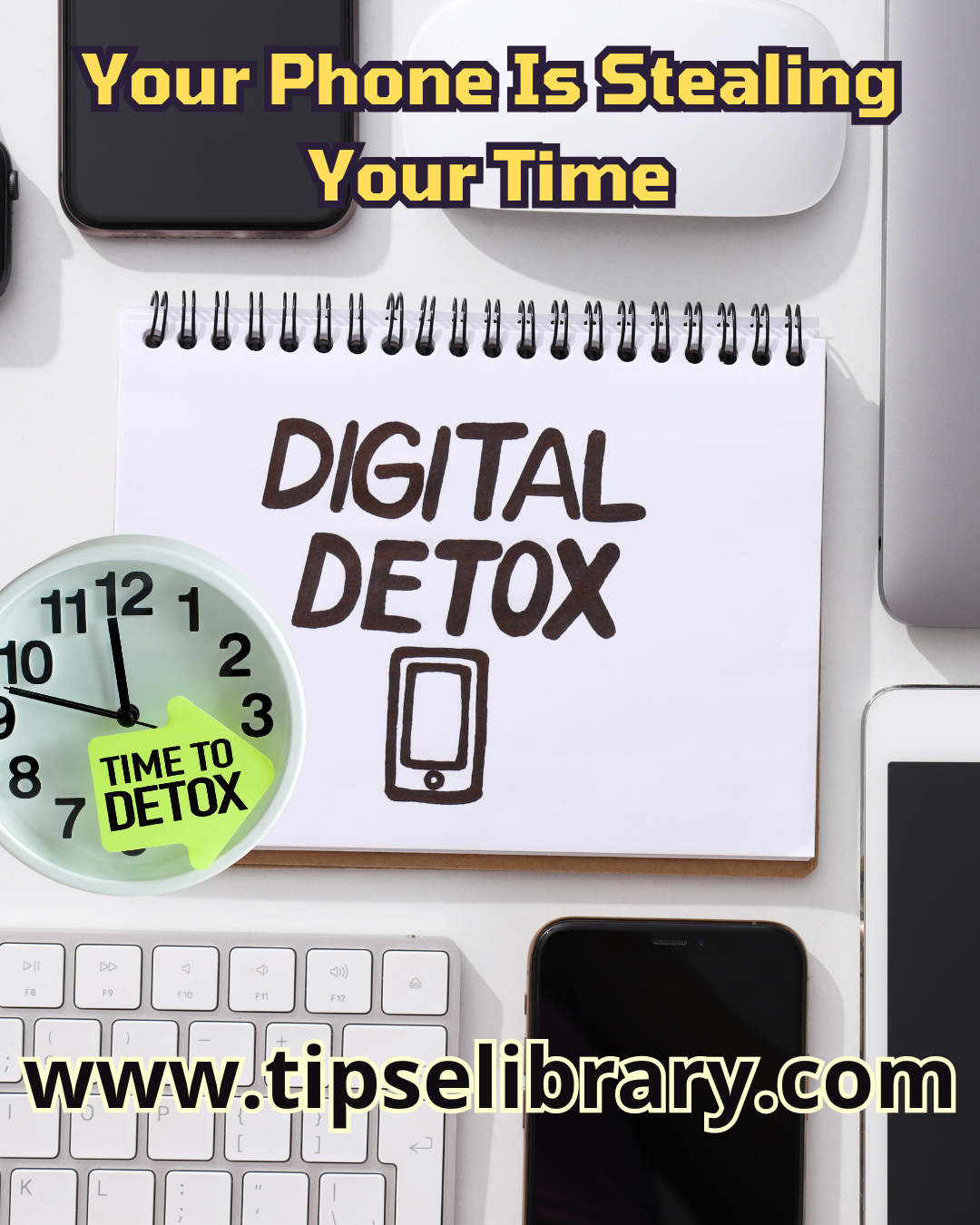Digital Detox in 2024: Reclaim Your Time from Smartphone Addiction
In our hyper-connected world, smartphones have become an extension of ourselves. But what if this constant companion is secretly sabotaging our time, focus, and wellbeing? As we navigate the digital landscape of 2024, it’s crucial to understand the hidden ways our phones impact our lives and learn effective strategies for a much-needed digital detox.

The Shocking Truth: 8 Ways Your Phone Is Stealing Your Time
1. The Phantom Vibration Syndrome
Have you ever felt your phone vibrate, only to check and find no notifications? You’re not alone. This phenomenon, known as Phantom Vibration Syndrome or “ringxiety,” affects up to 90% of smartphone users.
What it means for you:
- Increased anxiety and stress levels
- More frequent, unnecessary phone checks
- Disrupted focus and productivity
Expert Tip: Try turning off vibration for non-essential apps to reduce false alarms.
2. The Infinite Scroll Trap
Social media platforms and news apps are designed with infinite scroll features, making it easy to fall into a content consumption black hole.
Startling Fact: The average user scrolls the equivalent height of Mount Everest on their phone annually.
Impact on your time:
- Extended, unplanned screen time
- Reduced productivity
- Disrupted sleep patterns
Pro Tip: Set app time limits using your phone’s built-in digital wellbeing features.
3. Notification Overload
In 2024, the average smartphone user is bombarded with notifications from dozens of apps, leading to frequent interruptions.
Shocking Statistic: We check our phones an average of 96 times per day.
Time-stealing consequences:
- Each interruption can disrupt focus for up to 23 minutes
- Increased stress and anxiety
- Reduced ability to engage in deep work
Digital Detox Strategy: Implement “notification batching” by setting specific times to check and respond to notifications.
4. The Blue Light Deception
The blue light emitted by smartphone screens can have a significant impact on our sleep patterns and overall health.
Research shows: Exposure to blue light can suppress melatonin production by up to 22%.
How it affects your time:
- Difficulty falling asleep
- Reduced sleep quality
- Less efficient daytime functioning
Wellbeing Hack: Enable blue light filters on your devices and avoid screen time at least an hour before bed.
5. App Time Distortion
Many apps are designed to distort our perception of time, keeping us engaged longer than we intend.
Eye-opening fact: Users underestimate time spent on social media by an average of 40%.
Consequences for your schedule:
- Missed deadlines and appointments
- Procrastination on important tasks
- Reduced time for real-world interactions
Time Management Tip: Use screen time tracking apps to gain an accurate picture of your digital habits.
6. The Dopamine Loop
Smartphones and social media apps trigger dopamine release in our brains, creating addictive patterns similar to gambling.
Neuroscience insight: Likes, comments, and notifications activate the same brain regions as addictive substances.
Impact on your behavior:
- Compulsive checking of devices
- Difficulty focusing on non-digital tasks
- Withdrawal-like symptoms when unable to use your phone
Breaking the Cycle: Free your mind to become aware of your impulses and resist unnecessary phone checks.
7. Privacy for Attention Trade
Many “free” apps collect vast amounts of personal data, which is then used to create more engaging (and addictive) experiences.
Data point: The average app collects over 5000 data points on each user.
Hidden costs:
- Increased targeted advertising
- More personalized (and addictive) content recommendations
- Potential privacy and security risks
Protective Measure: Regularly audit your app permissions and delete unnecessary apps to reduce data collection.
8. Digital Amnesia
Overreliance on smartphones as external memory storage can impact our ability to recall information.
Concerning trend: 71% of people use their phones as “external brains” for storing important information.
Long-term effects:
- Decreased ability to remember important details
- Reduced cognitive exercise for memory functions
- Increased dependency on devices for daily tasks
Memory-Boosting Strategy: Practice memorizing important information like phone numbers and schedules without relying on your phone.
Reclaiming Your Time: Effective Digital Detox Strategies
Now that we’ve uncovered the shocking ways our phones steal our time, let’s explore practical strategies to regain control:
Implement a Digital Curfew
Set a specific time each evening when you “turn off” digitally. This helps regulate sleep patterns and creates space for offline activities.Create Phone-Free Zones
Designate areas in your home or workplace where phones are not allowed, promoting focused work and genuine interactions.Practice Mindful Phone Use
Before reaching for your phone, pause and ask yourself if it’s necessary. This simple habit can significantly reduce mindless scrolling.Engage in Digital Fasting
Try periodic “fasts” from your devices, starting with a few hours and gradually increasing to a full day or weekend.Customize Your Notification Settings
Take control of your attention by allowing notifications only from essential apps and contacts.Rediscover Analog Hobbies
Invest time in offline activities like reading physical books, gardening, or crafting to reduce dependency on digital entertainment.Use Technology to Fight Technology
Leverage apps designed to promote digital wellbeing, such as Forest or Space, which gamify the process of staying off your phone.Practice the 20-20-20 Rule
Every 20 minutes, take a 20-second break to look at something 20 feet away. This reduces eye strain and creates natural phone use breaks.
The Benefits of Digital Detox: What You Stand to Gain
Implementing these strategies can lead to significant improvements in various aspects of your life:
- Increased Productivity: Reclaim hours of your day for meaningful work and personal projects.
- Better Sleep Quality: Enjoy more restful nights and energized mornings.
- Enhanced Relationships: Foster deeper connections through undistracted, face-to-face interactions.
- Improved Mental Health: Reduce anxiety, stress, and symptoms of digital addiction.
- Greater Creativity: Allow your mind the space to wander and generate original ideas.
- Improved Physical Health: Decrease the risk of issues related to sedentary behavior and poor posture.
- Heightened Self-Awareness: Develop a better understanding of your habits, thoughts, and emotions.
- Reclaimed Agency: Take back control of your time and attention from algorithmic manipulation.
Conclusion
As we navigate the increasingly digital world of 2024, it’s clear that our relationship with smartphones needs a reset. By understanding the hidden ways our devices impact our time and implementing thoughtful digital detox strategies, we can cultivate a healthier, more balanced relationship with technology.
Remember, the goal isn’t to completely eliminate smartphones from our lives, but to use them intentionally as tools that enhance rather than detract from our wellbeing. Start small, be consistent, and watch as you reclaim not just your time, but your focus, creativity, and peace of mind.
Are you ready to take control of your digital life? Your journey towards a more balanced, fulfilling relationship with technology starts now.
Want to stay updated on the latest digital wellbeing strategies and tech-life balance tips? Subscribe to our newsletter for exclusive content, expert insights, and practical advice delivered straight to your inbox.
More from Tipelibrary
Crush Your Cravings: Proven Techniques to Win the Battle Against...
- November 30, 2023
- 10 Minutes
The Ultimate Guide to Choosing the Best Web Hosting and...
- July 18, 2024
- 7 Minutes
Windows 11 24H2 Update : The AI Revolution Starts Here?
- October 5, 2024
- 6 Minutes
Your Digital Shadow: The Scary Truth About Your Online Footprint
- April 27, 2024
- 4 Minutes
Exploring Apple’s 2024 Milestones: New MacBook Air, Software Updates, and...
- March 4, 2024
- 4 Minutes








